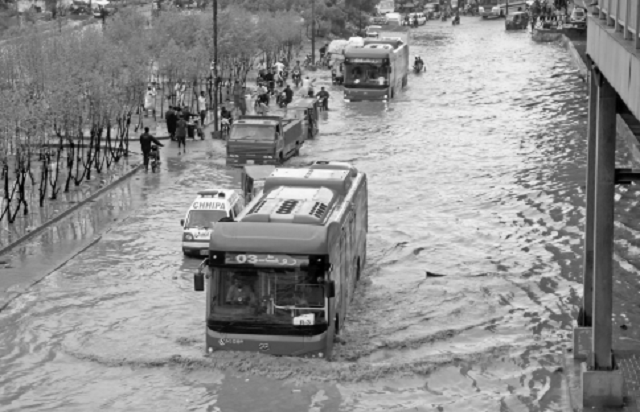
Heavy downpour led to sewage lines overflowing and mixing with rainwater which flooded houses and large commercial centres in the low-lying areas of Rawalpindi on Monday.
After the water receded, it left behind piles of dirty shopping bags and garbage everywhere. Stretches of mud mark the streets and dead rats, lizards and various insects have infested the area. In the aftermath, the spread and incidence of diseases has increased among the residents. They are demanding immediate cleaning and spraying of disinfectant in the affected areas to fight off the resulting stench. They also demanded immediate vaccination to prevent further spread of the disease in these areas. If the stagnant rainwater which is collected in places, like the small ponds that have emerged in cemeteries, are not cleared, there is a risk of dengue virus spreading across the city.
Approximately, two feet of sewage water flooded the bazaars, affecting Mochi Bazaar, Dingi Khoi Chowk, Kalan Bazaar, Moti Bazaar, Trunk Bazaar, Bara Bazaar, Sadiqabad Chowk, Misrial Road Bazaar and People's Colony Bazaar.
The toxic, polluted water also entered the streets and houses situated in the low-lying areas of Jan Colony, People's Colony, Sharon Colony, Dhok Khaba, Dhok Elhi Bakhsh, Arya Mohalla, Javed Colony, Nadeem Colony, Fazalabad, Chah Sultan, Millat Colony, Qasimabad and Fuji Colony. The residents of these areas, have since then been busy cleaning their houses and shops. They have spent hours washing their clothes and other goods contaminated by the dirty water and spreading it on the roofs of their houses to dry out.
Haji Ibrahim, a resident of Javed Colony, said that two feet of water entered his house, and after the water receded, dead rats surfaced in the rooms, the sewage stench is spreading in the areas, and yet, no team from the health department had come for spraying. Chaudhary Imran, a trader and shopkeeper from Dhok Elhi Bakhsh, said that the water remained accumulated on the road for seven hours. “After the water drained, all the filth from the drain was left behind on the road, including dead lizards, rats and kittens.
The stench of sewage lingered throughout the day and night,” he said, demanding that the road be cleaned, and vaccination and protective spray be arranged immediately.
Anjuman Tajaran Vegetable Market President, Ghulam Qadir Mir, said that the flood water caused havoc in the vegetable market of Mochi Bazaar. Due to water entering the shops, the valuable goods of the shops were destroyed. He set forth the demand that the shopkeepers who had suffered should be given interest free loans as reparations. Shiraz Masih, a resident of Sharon Colony, said that the Christian Colony, which is near the Soan River, was flooded after day before yesterday's rain, as it brought four feet of water into houses and shops, destroying furniture and other items, and no one came to their rescue. He exclaimed that a relief centre should be built there immediately.
Benazir Bhutto General Hospital Deputy Medical Superintendent, Dr Anayat said that the sewage from the drains mixed in the flood water, making it dangerous and hazardous. “This water can cause scabies and hepatitis. Vaccination should be done immediately in the affected areas and the areas should be thoroughly cleaned. Citizens should wash their rooms, floors and yards by mixing Dettol with water after the water recedes and spray their homes,” he instructed.
It continued to rain intermittently in the city throughout Tuesday as well. Residents of areas close to Nullah Leh and storm drains spent the night awake due to the overnight rain.
The forecast of continuous rain by the Meteorological Department has spread panic among the residents of low-lying areas. Citizens have started moving their valuables to safer places, while many have themselves temporarily relocated from low-lying areas to avoid the rainy season.



















COMMENTS
Comments are moderated and generally will be posted if they are on-topic and not abusive.
For more information, please see our Comments FAQ